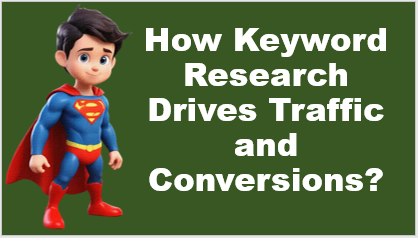How Keyword Research Drives Traffic and Conversions?
Keyword research isn’t just about finding words to sprinkle into your content, it’s the foundation of successful SEO and digital marketing. When done right, keyword research attracts the right audience, increases your visibility, and ultimately boosts your conversions.
Let’s break down exactly how keyword research impacts both traffic and conversions, and how you can use it to grow your business or blog.
1. Keyword Research Helps You Understand Your Audience
At its core, keyword research is audience research.
By discovering the exact terms your target users type into Google, you gain valuable insight into:
- What they want?
- What problems they’re trying to solve?
- How much they know about your niche?
- Where they are in the buying journey?
This allows you to create targeted content that speaks directly to their needs and goals, leading to more engagement, traffic, and trust.
Example:
If your audience searches for "best free keyword research tools," they’re likely beginners looking for affordable options. You can create a blog post comparing free tools and recommending one with a CTA (Call To Action) to sign up for your newsletter or course.
2. It Drives Organic Traffic from Search Engines
By targeting the right keywords, you increase your chances of ranking on search engine results pages (SERPs). This means:
- More visibility
- More clicks
- Sustainable traffic (without paying for ads)
The higher you rank for relevant keywords, the more users will find and visit your site.
Types of Keywords to Drive Traffic:
- Short-tail keywords: Broad terms like “SEO” (high volume but competitive)
- Long-tail keywords: Specific terms like “how to do keyword research for free” (lower volume but higher intent)
- Branded keywords: Your name or product (shows strong intent)
- Local keywords: “SEO expert in UK” (great for local services)
Tip: Use a mix of all types, with a focus on long-tail and low-competition keywords to grow faster, especially if your website is new.
3. It Increases Conversion Rates
Targeted keyword research helps you match your content to user intent—and that’s what drives conversions.
Let’s look at how different types of keywords influence the conversion journey:
Intent | Keyword Example | Conversion Goal
Informational | "what is on-page SEO" | Capture email via free guide
Commercial | "Ahrefs vs SEMrush comparison" | Get a product trial signup
Transactional | "buy keyword research tool" | Immediate purchase
When you align your content with the user’s intent, you’re not just attracting traffic—you’re attracting the right traffic that’s more likely to convert.
4. It Helps You Prioritize High-Value Content
Keyword research allows you to focus your efforts on content that has the most potential to bring results.
You can prioritize keywords based on:
- Search volume (how often it’s searched)
- Keyword difficulty (how competitive it is)
- Intent (where it falls in the funnel)
- CPC (Cost per Click) – a signal of commercial value
This way, you’re not wasting time creating content no one is searching for or can’t rank for. Instead, you're investing your time wisely and seeing measurable results.
5. It Guides Your Content Strategy
Keyword research is the first step in building a smart content calendar. Once you identify a set of related keywords, you can:
- Cluster them into topic groups
- Create pillar content + supporting blog posts
- Optimize internal linking
- Build topical authority
Example:
Let’s say your main topic is “Keyword Research.” You can build a cluster like this:
Main Guide: How to Do Keyword Research
Subtopics:
- Keyword research for beginners
- Free keyword research tools
- Long-tail keyword examples
- How to find low competition keywords?
- Keyword intent explained
This not only boosts SEO but keeps readers on your site longer—leading to higher chances of conversion.
6. It Improves User Experience (UX)
Good keyword research also improves on-page SEO and user experience. When your content is closely aligned with the search query:
- The headline matches their need
- The intro grabs their attention
- The content solves their problem
- The CTA leads them to the next step
This makes users happy, which in turn makes Google happy—because Google prioritizes content that satisfies user intent.
7. It Supports Paid Marketing Campaigns Too
If you're running Google Ads or social media campaigns, keyword research helps optimize your:
- Ad copy
- Landing pages
- Audience targeting
Using high-converting keywords in your ads ensures better quality scores, lower CPC, and more relevant clicks. It's a win-win for both organic and paid traffic.
8. It Enables Better Analytics and Optimization
Once you’ve published content based on keyword research, you can:
- Track keyword rankings (with tools like Ahrefs, SEMrush, or Google Search Console)
- Monitor traffic behavior (via Google Analytics)
- Identify top-performing keywords and content
- Improve or update pages to boost performance
Pro tip: Look at what’s converting and double down on similar keywords.
Real-World Results: Keyword Research in Action
Let’s say you run a blog about online tools.
- You discover that “best free keyword research tools” has a decent search volume with low competition.
- You create a high-quality blog post around it.
- You optimize the title, meta description, and content using related keywords.
- You start ranking on page 1 in 3–4 weeks.
- Organic traffic rises.
- Readers click on your affiliate links or sign up for your newsletter.
- You turn search traffic into real revenue.
In shorts, keyword research drives traffic by helping you rank higher in search engines. It drives conversions by ensuring your content matches the needs and intent of your target audience.
Whether you’re creating blog posts, product pages, YouTube videos, or landing pages—everything starts with knowing what people are searching for and why.
- More visibility
- ore relevant visitors
- More trust
- More action taken on your site

